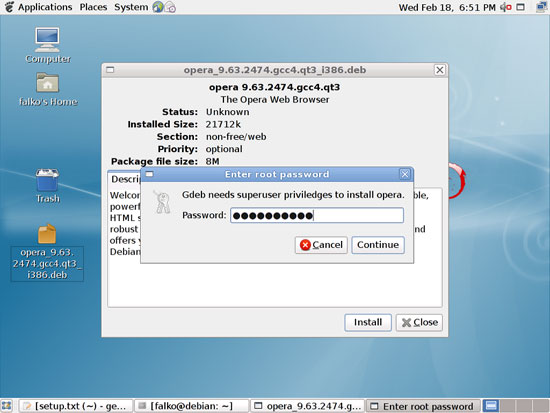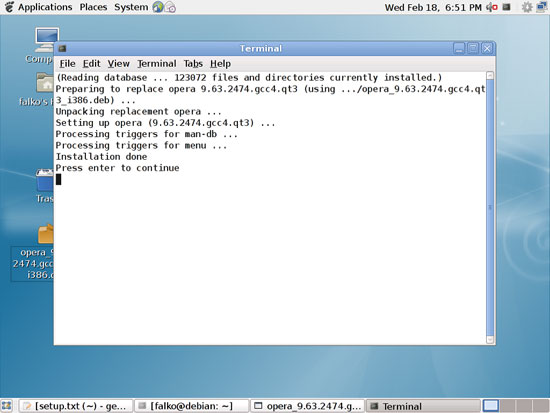The Perfect Desktop - Debian Lenny - Page 4
This tutorial exists for these OS versions
- Debian 6 (Squeeze)
- Debian 5 (Lenny)
- Fedora 8
- Debian 4 (Etch)
- Fedora 6
On this page
10 Opera
Open a browser and go to http://www.opera.com/browser/download/; select Debian as the distribution and then Debian 4.0 (Etch), Debian Testing (Lenny), Debian Unstable (Sid) and click on the Download Opera button:
On the next page, a download dialogue should pop up; click on Save File:
After the download has finished, right-click on the downloaded file and select Open with "Gdeb" from the menu:
A new window opens - click in Install:
Type in the root password:
A terminal window opens where the package is installed. Press ENTER after the successful installation to close the terminal:
---
A second way to install Opera is to use gdebi as root from the command line. In contrast to Gdeb, gdebi resolves all dependencies of a package, so you should use this if you are getting dependency problems with Gdeb.
Open a terminal and become root:
su
You can then install Opera as follows:
gdebi /home/falko/Desktop/opera_9.63.2474.gcc4.qt3_i386.deb
Make sure you use the correct path; also the package name can differ, for example if there is a newer version - use the TAB key to use autocompletion in the terminal.
11 Skype
To download Skype, go to http://www.skype.com/download/skype/linux/, and click on the Download now button. On the next page, select Debian Etch:
Download the file to your computer...
... and then install it exactly as shown for Opera in the previous chapter (either with Gdeb or with gdebi).
12 KompoZer
Go to http://kompozer.net/ and click on the Debian package link in the right column:
On the next page, a download dialogue should open. Download the file to your computer...
... and then install it exactly as shown for Opera (either with Gdeb or with gdebi).
13 Google Picasa
Go to http://picasa.google.com/linux/download.html#picasa30 and select the right .deb package for your architecture (i386 or amd64):
Save the file to your computer...
... and then install it exactly as shown for Opera (either with Gdeb or with gdebi).
14 Google Earth
Go to http://earth.google.com/intl/en/download-earth.html and click on the Agree and Download button:
On the next page, a download dialogue should pop up. Click on Save File and save the file to your computer, e.g. the desktop (/home/falko/Desktop in this example):
Then open a terminal and become root:
su
Make the downloaded file executable and run it:
cd /home/falko/Desktop/
chmod 755 GoogleEarthLinux.bin
./GoogleEarthLinux.bin
This will start the installation. A Google Earth Setup window opens. Accept all default settings and click on Begin Install:
After the installation, you can click on Quit or on Start, if you want to start Google Earth now:
Afterwards, we delete the Google Earth installer:
rm -f GoogleEarthLinux.bin
15 Inventory (III)
Browse the menu again and check what you've got installed so far.
Your list should look like this now:
Graphics:
[x] The GIMP
[x] F-Spot
[x] Picasa
Internet:
[x] Firefox/Iceweasel
[x] Opera
[x] Flash Player
[x] FileZilla
[x] Thunderbird/Icedove
[x] Evolution
[x] aMule
[x] Transmission BitTorrent Client
[x] Azureus/Vuze
[x] Pidgin
[x] Skype
[x] Google Earth
[x] Xchat IRC
Office:
[x] OpenOffice Writer
[x] OpenOffice Calc
[x] Adobe Reader
[x] GnuCash
[x] Scribus
Sound & Video:
[x] Amarok
[x] Audacity
[x] Banshee
[x] MPlayer
[x] Rhythmbox Music Player
[x] gtkPod
[x] XMMS
[x] dvd::rip
[x] Kino
[x] Sound Juicer CD Extractor
[x] VLC Media Player
[x] Real Player
[x] Totem
[x] Xine
[x] Brasero
[x] K3B
[x] Multimedia-Codecs
Programming:
[x] KompoZer
[x] Bluefish
[x] Quanta Plus
Other:
[ ] VMware Server
[x] TrueType fonts
[x] Java
[x] Read/Write support for NTFS partitions


















